
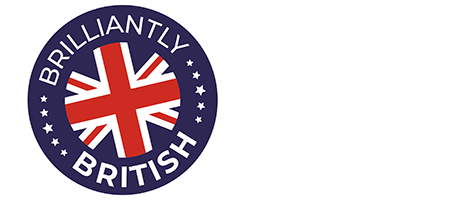
X
This site uses cookies. By continuing to use this site you agree to our use of cookies. To find out more, see our Privacy Policy and Cookie Policy.

When it comes to researching the right flag for your needs, you can often be left with more questions than answers. What initially seems like a simple decision to make, can actually be more complex than you think. But as the leading specialists in flags, flagpoles and banner pole solutions for homes, businesses and public spaces, we’re here to make your buying experience as easy as possible. So, here’s everything you need to know about choosing a flag that’s right for you:
At Harrison Flagpoles, we can produce any size required. Standard flag sizes are:
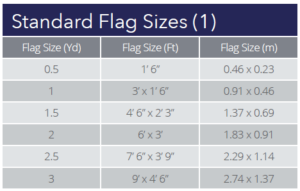
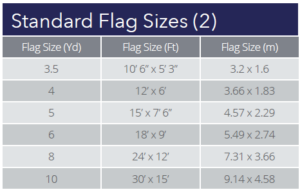
However, if you are flying your flag on a flagpole, then you should follow particular guidelines:
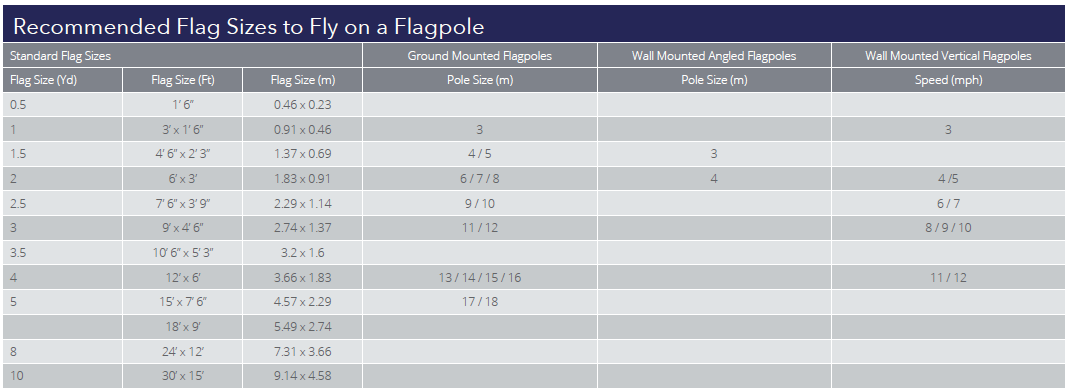
Flags are made using a woven polyester with knitted polyester overlays. The two most popular materials are knitted polyester (printed flags) and woven (hand sewn and printed). If you require flags for temporary, medium or event use, printed flags are ideal.
All of our handsewn flags are produced by hand by our talented team of seamstresses right here in the UK. We use the highest quality material which has been approved by the Ministry of Defence. Hand sewn flags are a more traditional style and are made of thicker material than printed flags (150gsm-200gsm compared to 115gsm knitted polyester). They are therefore more durable and longer lasting than printed flags. As well as this, virtually any design/logo can be manufactured too!
We pioneered environmentally friendly flag solutions with the launch of our Harrison Eco™ range in 2018. The flags within this range are made from recycled plastic items, including single-use PET plastic bottles and industrial polyester waste; items that would have been sent to landfill had we not been innovative with the materials we use. How does it work? Well, the plastic is firstly processed into a yarn and then formed into our material for a sustainable option. Harrison Eco™ flags have the same durability, strength and versatility as its knitted polyester equivalent, but they have a much lower environmental impact. The production of our Harrison Eco™ flags creates 75% less CO₂ emissions than virgin polyester in production! Take a look at our Harrison Eco™ range here.
The main things that affect the price of printed flags are the number of colours in your artwork and how many flags you need. There are two main types of print processes:
We can also print onto 150-gram woven polyester (our hand sewn flags) if needed.
To speak to someone about your artwork requirements and the printing process, contact our expert team on 01325 355433 or email sales@weareharrisons.com.
Single or double sided is available, however national flags are always single sided.
Single sided prints have a mirror image on the back of the flag as the design bleeds through onto the reverse. Double sided reads correctly on both sizes, which is two prints sewn together back-to-back with an inter liner in between. It all depends on your needs and preferences!
All of our flags are manufactured to the highest standard and are available in various finishes, meaning they can be flown on any type of flagpole. The finishing of flags is dependent on how the flag will be flown and on what type of flagpole:
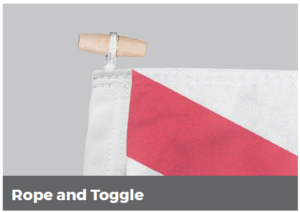
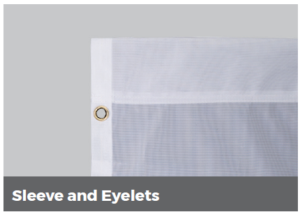
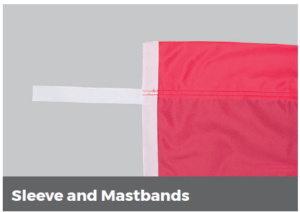
Anti-fray netting can be added onto the fly end of the flag so it takes the whip of the wind and begins to fray before the flag. When the anti-fray starts to fray, simply return it to us and more anti-fray netting can be added, thus extending the life of your flag. Anti-fray is very cost effective when taking into account the initial flag investment.
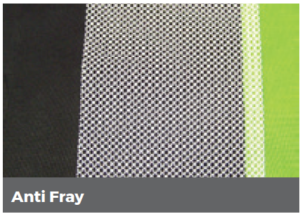
No manufacturer can guarantee how long a flag will last because it depends on how the flag is maintained. There are many elements that can affect the life expectancy of your flag including the geographical location, material used, weather conditions, and location of the flagpole. For more information on how long your flag will last, visit one of our latest posts ‘What is the average lifespan of a flag?’
High wind speeds can weaken your flag if it’s not cared for appropriately. If flying your flag on a flagpole, all of our flagpoles come with full technical specifications. In here, you’ll find maximum wind speeds that each flagpole is capable of withstanding. Here, we have included The Beaufort Scale of Wind Force to help you ascertain whether your desired location is suitable for flag flying:
You can also try searching for a wind chart specific to your area, especially in times of bad weather, to see whether it would be advisable to bring your flag down.
To end our flag buying guide, we have listed some flag protocols for you to consider, particularly when it comes to flying the Union flag:
To take a look at our range of flags, click here.
Alternatively, if you need any advice on selecting the right flag for you, speak to one of our specialist advisers by either calling 01325 355 433 or emailing sales@weareharrisons.com.
Harrison Flagpoles is the only independent manufacturer of glassfibre flagpoles in the UK. Our 50-year manufacturing heritage has equipped us with the experience, knowledge and skills needed to undertake even the most complex and challenging of jobs.